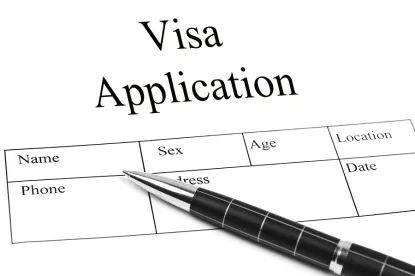On Dec. 15, 2022, Congress passed the James M. Inhofe National Defense Authorization Act for Fiscal Year 2023 (the “2023 NDAA”), which contains two key changes to the eligibility for E visas:
-
First, Portugal has now been designated as a treaty country. Thus, Portuguese passport holders are eligible to obtain E-1 and E-2 visas as Treaty Trader/Treaty Investors.
-
Second, the 2023 NDAA inserted a limitation on the eligibility for an E visa by adding a new requirement that E visa applicants who have acquired citizenship of a treaty country via financial investment must have been “domiciled” in the treaty country for a “a continuous period of not less than three years at any point before applying” for the E visa. Notably, this new requirement does not apply to existing or previous E visa holders.
The purpose of this provision is to limit a pathway to U.S. residency that was previously open to individuals who applied for citizenship by investment programs in certain E visa treaty countries, primarily Grenada. In these scenarios, the individual from a non-E visa treaty country would obtain citizenship in Grenada via investment, and then use their newfound Grenadian citizenship to apply for an E visa. Thus, the value of the Grenadian passport to these individuals was the ability to obtain an E visa.
Individuals from countries where investment migration is popular, such as India and China, have long had a desire to access the United States for purposes of school, investment, or retirement, among other reasons. Because China and India are not E visa treaty countries, individuals from those countries have less options for migration to the United States, particularly if they do not have a qualifying family relative. Obtaining citizenship from a country such as Grenada became a worthwhile endeavor in order to access the United States. This was especially so because the E visa has many advantages, such as a relatively low amount of investment, the ability to include spouses and dependent children under the age of 21 with one investment, long visa validity periods, and the ability to renew the E visa indefinitely.
For some, this provision takes effect immediately. Thus, an individual who has made, or intends to make, an investment in a citizenship by investment country eligible for an E visa finds themselves newly ineligible for such E visa, unless they can show they have “…been domiciled for a continuous period of not less than three years at any point before applying for…” an E visa.
The term “domicile” is not found in the 2023 NDAA, and it is unclear how the U.S. Department of State will apply this requirement to E visa applicants. The word “domicile” under U.S. law pertaining to immigration has been subject to change and dispute over the years because the Immigration and Nationality Act (INA) does not generally define “domicile.”
In other contexts, such as the use of “domicile” under INA 213A as interpreted by the State Department (the provision of law relating to the domicile of a U.S. sponsor), “domicile” means the place where an individual has their principal residence with the intention to maintain that residence for the foreseeable future. In this context, under the Foreign Affairs Manual issued by the State Department, evidence that an individual is “domiciled” in the United States can include (i) opening a bank account; (ii) transferring funds to the United States; (iii) Making investments in the United States; (iv) Seeking employment in the United States; (v) Registering children in U.S. schools; (vi) Applying for a Social Security number; and (vii) Voting in local, State, or Federal elections.
This State Department interpretation is generally consistent with other areas of U.S. immigration law that define “domicile,” such as certain areas of law defining U.S. citizenship by adopted children[3] and residents of the Commonwealth of the Northern Mariana Islands,[4] which also generally defines “domicile” as the place where an individual maintains a residency with the intent to reside in that place for an indefinite period. These definitions are consistent with the common law interpretation of “domicile,” which also generally defines a “domicile” as a “person’s true, fixed, principal, and permanent home, to which that person intends to return and remain even though currently residing elsewhere.”[5]
While this is not an exhaustive review of U.S. law as it relates to the term “domicile,” it does provide a general idea of what to expect once the State Department announces guidance on this change in law. Applying this guidance to the new E visa requirement of “domicile” could entail requiring the applicant to show a residence in the treaty country, investments in the treaty country, bank accounts in the treaty country, funds in the treaty country, employment in the treaty country, participation in the treaty country elections and/or civic life, and/or, if applicable, attendance at schools in the treaty country by children of the applicant. Further, as like most areas of U.S. immigration law, this will not be a one-size-fits-all approach, and a totality of the circumstances review in the discretion of the adjudicating consular officer should be expected. Applicants interested in applying for an E visa after acquiring citizenship by investment will need to wait for the State Department to issue guidance, likely in the form of an updated Foreign Affairs Manual.
Finally, it remains to be seen whether these changes in the 2023 NDAA violate U.S. treaty obligations for E visa countries with citizenship by investment programs (e.g., Grenada, Turkey, Austria, Jordan, etc.). Generally speaking, E visa treaties require each party to permit and treat investment activities in the United States on a basis no less favorable to that accorded the other party, must provide “fair and equitable treatment” to the other party, to not impair, through unreasonable or discriminatory means, investments of a party, among other requirements.[6] Given the amount of investment seen by some of these countries solely due to the access to an E visa, and the less favorable treatment nationals of those countries will now receive, particularly in comparison to other E visa countries without citizenship by investment programs, it is conceivable these E visa countries raise a diplomatic issue with these new provisions.
FOOTNOTES
[1] See 9 FAM 601.14-7(a)(1).
[2] See 9 FAM 601.14-7(a)(3)
[3] See INA 101(c) and INA 101(a)(33)
[4] See Section 1005(e) of the Covenant to Establish the Commonwealth of the Northern Mariana Islands in Political Union with the United States (Act of Mar. 24, 1976, Public Law No. 94-241, 90 Stat. 263, 48 U.S.C. 1801). See also 8 FAM 302.2-4.
[5] See Black’s Law Dictionary (11th ed. 2019). See also Mississippi Band of Choctaw Indians v. Holyfield, 490 U.S. 30, 48, 109 S.Ct. 1597, 104 L.Ed.2d 29 (1989) (defining “domicile” as “physical presence in a place in connection with a certain state of mind concerning one’s intent to remain there”), cited in in the immigration context by Morel v. INS, 90 F. 3d 833 (3rd Cir., 1996).
[6] See e.g., Treaty between the Government of the United States of America and the Government of the Hashemite Kingdom of Jordan Concerning the Encouragement and Reciprocal Protection of Investment, with Annex and Protocol, signed at Amman on July 2, 1997, or The Treaty between the United States of America and Grenada concerning the Reciprocal Encouragement and Protection of Investment, signed at Washington on May 2, 1986.



 />i
/>i
